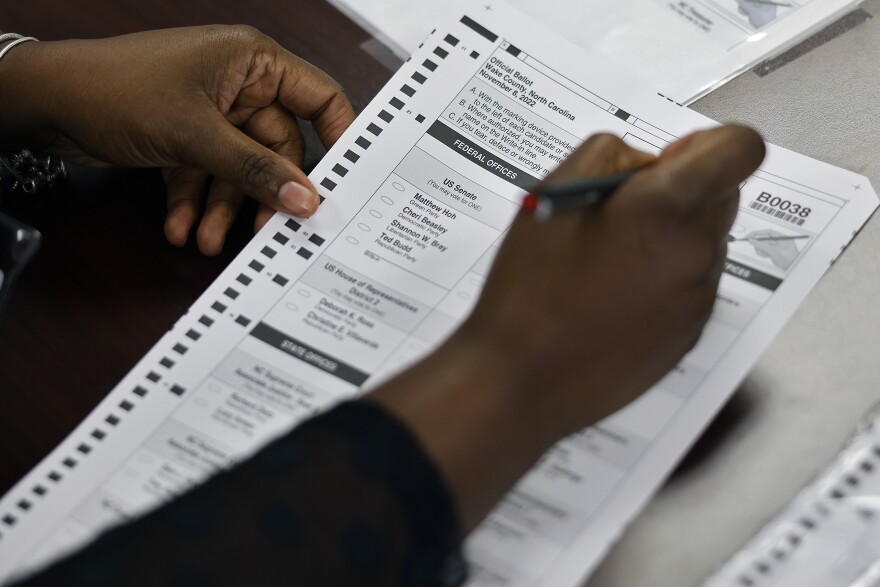State Sen. Jay Chaudhuri (D-Wake) told his colleagues he was puzzled.
"You know, the best way for us to fight voter fraud is for our state to join the Electronic Registration Information Center, or ERIC," Chaudhuri said during floor debate at the North Carolina General Assembly a week ago, noting the organization was started in 2012 by seven states, four of them politically dominated by Republicans.
Chaudhuri was urging his colleagues to amend a GOP-drafted budget bill that, like a House spending plan, would prevent North Carolina from joining the multi-state consortium through which members share information and data on the movement and deaths of voters.

Just last year the Republican-controlled General Assembly authorized funding for North Carolina to join ERIC.
"The value of ERIC in the beginning was when it had 31 or more member states that could collaborate and have cross-data base referencing," said Sen. Warren Daniel (R-Buncombe, Burke, McDowell), a co-chair of the Senate Redistricting and Elections Committee, explaining his opposition to joining ERIC.
In the past 18 months, eight states, all deeply red or Republican-leaning, have pulled out of ERIC, reducing the membership from 34 to 25 states and the District of Columbia. The departing states include Florida and Ohio.
In Florida, Gov. Ron DeSantis previously extolled the virtues of ERIC and is trying to position himself for a GOP presidential primary. In Ohio, too, Secretary of State Frank LaRose praised ERIC in the past, but pulled his state out as he mulls a Republican primary run for U.S. Senate.
Partnerships like ERIC are 'necessary' for clean voter rolls, South Carolina elections spokesman says
Despite the departures, ERIC remains a "valuable" and "irreplaceable" tool in maintaining clean voter rolls, according to John Catalano, public information officer for the South Carolina State Election Commission. South Carolina, Texas, and Georgia — all states where Republicans hold the reins of state government — are still members of ERIC.
"If we want voter rolls to be up to date, if we want inactive people or people who are disqualified off of our active voter registration rolls, then we have to accept that partnerships are necessary," Catalano told WUNC.
Catalano said membership provides his state with two big benefits. One is the access it gives South Carolina to federal Social Security Administration data on South Carolina voters who have died out of state.
"And we don't have another way of getting that data at this time," Catalano added.
The other benefit is the information it gets from other ERIC members on South Carolina voters who have moved and registered in other states.
"We know that most of the time voters don't come back and tell their original jurisdiction that they left," Catalano said.
ERIC has been under attack from the partisan right
State legislators' turnaround on whether North Carolina should join ERIC comes just as the 11-year-old organization endures partisan attacks from the right. Among them, baseless claims that ERIC serves liberal interests.
Part of that had to do with one of the founders of ERIC: David Becker. In 2008, when he was with the Pew Charitable Trusts, Becker helped conceive and establish ERIC. In the aftermath of the 2020 presidential election, Becker vociferously fought against the lie that Donald Trump actually won.
Becker's current organization — the non-partisan Center for Election Innovation & Research — focuses on countering false narratives about voter fraud and works to improve election security.

Until recently, Becker was a non-voting, ex-official member of ERIC's board, but stepped down amid the conspiracy theories.
Daniel — the State Senator representing counties in western North Carolina — said his and other GOP lawmakers' attitudes changed as they've learned more about ERIC's bylaws, which includes a requirement that member states send automatic notices to residents who become eligible to vote.
"Also, that's an expensive provision too," Daniel added.
For Catalano, it's clear the nationwide effort to disparage ERIC is coming from partisan groups who subscribe to the falsehood that elections are being stolen.
"I would say that it's probably those that are on the far, far right or just believe that elections have been compromised," Catalano said.
And Republican lawmakers in charge of the North Carolina General Assembly are committed to keeping the state out of ERIC.








